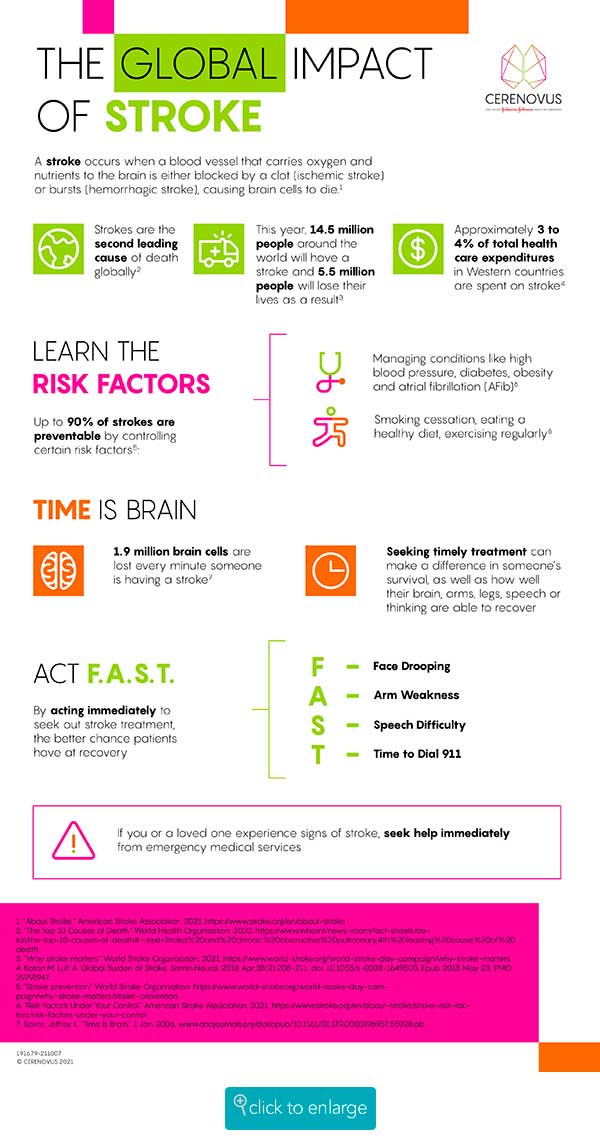
(Family Features) Strokes, the second-leading cause of death globally, affect millions of people each year. A stroke can cause lasting disability and unimaginable pain for those impacted and their loved ones.
This year, 14.5 million people globally will have a stroke and 5.5 million people will die as a result, according to the World Stroke Organization. This World Stroke Day, learn how to reduce your risk for stroke, how to identify the signs and symptoms and why timely response and treatment are critical.
 1. Talk to your doctor about ways to prevent stroke
1. Talk to your doctor about ways to prevent stroke
A stroke occurs when a blood vessel that carries oxygen and nutrients to the brain is either blocked by a clot (ischemic stroke) or bursts (hemorrhagic stroke). When this happens, part of the brain cannot get the blood and oxygen it needs, causing brain cells to die.
While strokes can be devastating and deadly, up to 90% are preventable and many risk factors can be controlled before they cause a stroke. By managing conditions like high blood pressure, diabetes, obesity and atrial fibrillation (AFib); ceasing smoking; eating a healthy diet; getting regular exercise; and taking all prescribed medications, you can decrease your risk. Treating AFib, an irregular heart rhythm disorder, is particularly important as it is associated with a five-fold increased risk of ischemic stroke.
2. Recognize signs and symptoms of stroke
When a stroke occurs, acting F.A.S.T. can help you get timely treatment needed to survive. If you recognize the signs and symptoms of a stroke – face weakness, arm weakness and speech slurring – it’s time to call for help.
While F.A.S.T. is a commonly used acronym to identify the signs of stroke, it is important to understand the relationship between a stroke and the time it takes to receive care. When brain cells die, brain function is lost. In fact, 1.9 million brain cells are lost every minute someone is having a stroke. Quickly identifying signs of a stroke and seeking immediate treatment can save your life or reduce long-term disability. Reducing the amount of time between the onset of stroke and treatment can make a difference in how well your brain, arms, legs, speech and thinking are able to recover.
“Stroke can be a deadly and devastating neurological event,” said Mark Dickinson, worldwide president, CERENOVUS, a company committed to changing the trajectory of stroke and offering a broad portfolio of devices used in the endovascular treatment of stroke. “Yet when care and treatment is sought in a timely way, the chances of survival and recovery can increase significantly. This World Stroke Day – and every day – we must continue to raise awareness of the signs and symptoms of stroke and the need to seek timely medical care. With stroke, every second and every minute counts.”
3. Know your treatment options for stroke
Seeking treatment for stroke immediately means you have more treatment options available to you, such as being eligible to receive tissue plasminogen activator or mechanical thrombectomy (MT) for ischemic stroke, the most common type of stroke. MT, a minimally invasive blood clot retrieval procedure, helps improve the chances you’ll survive an ischemic stroke and make a full recovery. Treatment options for hemorrhagic stroke include surgery to remove, repair or clip a ruptured aneurysm.
If you or a loved one experience signs of stroke, seek help immediately from emergency medical services. To learn more about stroke, or find a doctor near you, visit bit.ly/3BpCWQW.
Photo courtesy of Adobe Stock
SOURCE:
CERENOVUS


